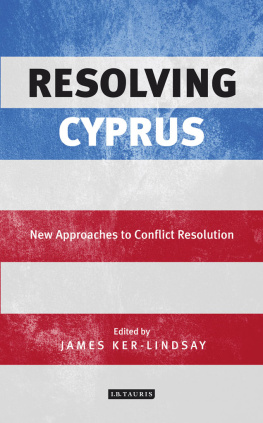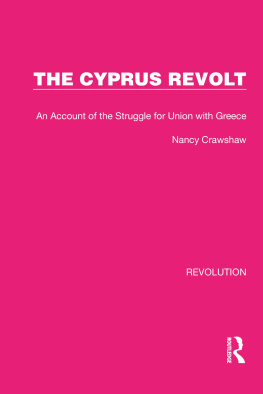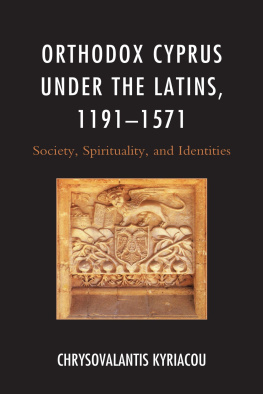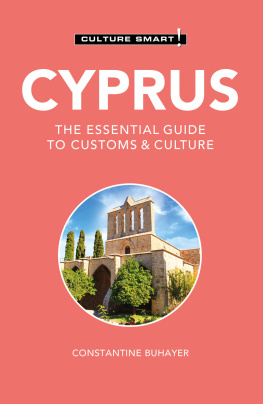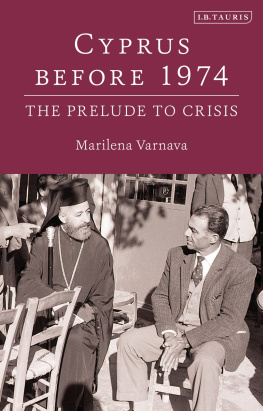Published in 2012 by I.B.Tauris & Co Ltd.
6 Salem Road, London W2 4BU
175 Fifth Avenue, New York NY 10010
www.ibtauris.com
Distributed in the United States and Canada
Exclusively by Palgrave MacMillan
175 Fifth Avenue, New York, NY 10010
Copyright 2012, Lisa Dikomitis
The right of Lisa Dikomitis to be identified as the author of this work has been asserted by the author in accordance with the Copyright, Designs and Patent Act 1998.
All rights reserved. Except for brief quotations in a review, this book, or any part thereof, may not be reproduced, stored in or introduced into a retrieval system, or transmitted, in any form or by any means, electronic, mechanical, photocopying, recording or otherwise, without the prior written permission of the publisher.
International Library of Ethnicity, Identity and Culture Vol. 1
ISBN: 978 1 84885 899 2
A full CIP record for this book is available from the British Library
A full CIP record for this book is available from the Library of Congress
Library of Congress catalogue card: available
Typeset by Newgen Publishers, Chennai
Printed and bound by CPI Group (UK) Ltd, Croydon, CR0 4YY
To Vassos and Nefeli & in memory of Angelos Dikomitis, Ibrahim Karabardak and Lies Demuynck
ACKNOWLEDGEMENTS
The present study has been financially supported by several funding bodies and research centres. I would like to express my gratitude to the Department of Comparative Sciences of Cultures (Ghent University, Belgium), the A.G. Leventis Foundation, the Research Foundation Flanders and SCAM-Belgium.
My first and primary thanks go to Rik Pinxten who supervised my doctoral research. I owe an enormous debt of gratitude to Rik, both teacher and friend, for his understanding and patience. Peter Loizos, who was the main advisor of my doctoral thesis, has supported my work from the beginning, and still does so today. His work encouraged me to think about Cypriot refugees in new and original ways and inspired me to carry out the doctoral project on which this book is based. Peter has been unstintingly supportive and generous with his time and always commented on my work with enormous care and provided motivating advice. With his great sense of humour, his understanding of my personal context and his belief that my research was worth doing he gave me the stimulation to carry on.
I am blessed to have been a member of the Department of Comparative Sciences of Cultures at Ghent University for almost a decade now. I would like to thank all my colleagues for their interest, guidance and especially their understanding when I left for yet another fieldwork period. Special thanks go to my colleague and friend Chia Longman who has been always there when I most needed her support.
Many friends in academia have read parts of this book or gave insightful comments at several stages of my fieldwork. Very many thanks are due to Georgos Agelopoulos, Stefan Beck, Olga Demetriou, Mete Hatay, Renee Hirschon, Adam Kaul, Steve Lyon, Yael Navaro-Yashin, Yiannis Papadakis, Marios Sarris, Julie Scott, Spyros Spyrou, Zenon Stavrinides, Marc Verlot, Eftihia Voutira and Gisela Welz. I also wish to thank Rasna Dhillon and Tomasz Hoskins, my editors at I.B.Tauris, for their encouragement and patience. I am grateful to Carrie Rodomar for the sharp proofreading. It goes without saying that all errors, omissions and lack of understanding in this book are entirely mine.
I could not have carried out my fieldwork without the help, trust and support of the Kozanllar and the Larnatsjiotes. Without them this research would simply not have been possible.
My Larnatsjiotes-relatives did everything they could to help. I want to thank them for accommodation, numerous meals and the willingness to engage with my research. I am particularly grateful to my aunts Koula Photiadou and Niki Dikomitou, my cousin Olymbia Dikomitou and my godfather Ouranios Dikomitis. Thanks also go to the relatives of my partner Vassos, especially to Angela Petridi and Lakis Argyrou, who helped in various ways. Finally, I owe an enormous debt of gratitude to my aunt Ireni Dicomitou. It is no exaggeration to say that I would not have been able to carry out this research without her help and support in far too many ways to mention here.
I feel great sorrow that my uncle Angelos Dikomitis passed away on 15 August 2010, before I finished this book. Angelos influenced my work in many ways and I co-dedicate this book to him. I am sure he would have been very happy with the photograph on the cover.
My deepest thanks go to my friends for their constant encouragement. Special thanks to Evgenia Akrivou, Georgos Anastassiades, Leen Bartholomeus, Jan Cappelle, Ann Degraeve, Kaat Dewolf, Karen and Isolde Dewyn, Eddie dHeere, Peter Edlind, Maria Hadjiantoni, Andri Mannouri, Kosta Pavlowitch, Athena Piki, Annemie Stuer, Ewout Vansteenkiste, Trui Verschelde, Vincent Vandevyvere, Mieke Wallays and Natasa Xenophontos.
Ruben Dekeyzer and Inge Oosterlinck, our best friends in Belgium, have been inconceivably generous with their friendship and their unending support when I encountered difficult times. Charlotte Pannier always helped me with her fascinating ability to sort out my confused thoughts about work and life. I have enjoyed her company more than she probably knows during the summers she spent in Cyprus. Christina Lambrou is the best of friends on whom I could always count during the most difficult times. She made me tea, pot after pot, and continuously filled my life with her magic. It is a pleasure to thank Xenios Anastassiades who has been very supportive throughout this project and was always ready to help me with all sorts of problems. Over the past decade we have shared countless dinners together and I always look forward to the next one. I met Xenia Andreou in recent years and she very quickly became a precious friend who shares the same taste for life and all things good. My warmest thanks go to five extraordinary children who force me to leave my own world of books and pencils: my beautiful godson Stan Dekeyzer and his brother Tijl, Nedy Kyriacou, Anna Pavlowitch and Lily Waldvogel.
I am deeply saddened that my dear friend Ibrahim Karabardak passed away before he was able to see this book. Ibo spent countless hours showing me around north Cyprus, driving me to and from my two field sites, looking up information and answering my questions in infinite detail. His loss is greatly felt by those in the reunification movement in Cyprus. In the final phase of preparation for this book, my dear childhood friend Lies Demuynck died after a long struggle with multiple sclerosis. I have finished this book with Ibo and Lies constantly on my mind.
I have no words to thank my glorious nuclear family. For my parents patience, advice and financial support I owe an un-repayable debt. They sustained me throughout my education and kept telling me the things that a daughter wants to hear: that was I was doing was important and that everything would be perfect in the end. My father Andreas infected me with a passion for all things Cypriot, which in turn laid the very foundation of this book. He gave me a model of how to live in peace, something to which I will always aspire. My mother, Martine Vandevelde, taught me how to be creative in her own particular and inspiring way. She always makes me attentive to the complexity of life in general and asks me the right questions at the right time, for which I thank her. My brother Simeon and his wife Stephanie have been of great help, in particular since the arrival of my daughter Nefeli. I love to be around my brother, especially when his insane sense of humour is switched on maximum. My sister, Elena, as she very well knows, is my best friend and has helped and supported me more than anyone else. Elena and her partner Bram lived and breathed this research when we shared a flat in Ghent. Bram was always absurdly entertaining and brought music back into my life. Elena is brilliant, beautiful and incredibly patient. My parents and siblings mean everything to me. This will always be the case, even when I live far away from them.


